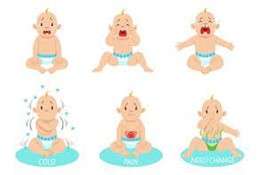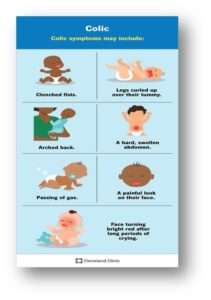A colic pain in babies: How to identify and treat it:
- Dr Owais Rafiq
- August 11, 2024
- 12:41 pm

Babies experiencing colic pain typically wail uncontrollably for several hours or even weeks at a time, frequently for no apparent reason. About 20% of babies are
Babies’ colic pain causes include:
Although the precise origin of colic is uncertain, several ideas and risk factors have been put forth.
- Foods to avoid while breastfeeding colic-pain babies
- Indigestion and gas
- Hormonal factor
- Sensitivity to light or noise
- Incapacity to self-soothe
- Overstimulation
Who is at risk of developing colic pain:
All infants: Colic can afflict any infant, regardless of gender, birth weight, or type of feeding (vital nutrition vs. formula). It is impossible to foresee which infants may experience colic. Smoking during pregnancy: Research indicates that there may be a modest increased risk for children whose moms smoked either during or after giving birth.
Avoid foods while breastfeeding in colic pain in babies: Fish that are high in mercury, such as swordfish and king mackerel, can raise the possibility of mercury exposure in breast milk. These veggies include Brussels sprouts, broccoli, cauliflower, and cabbage. Although these are the primary issues, numerous theories have yet to be definitively verified, such as. Family background: Further study is necessary, although some studies point to a potential connection between colic and a family history of the condition.
Delivery via C-section: Strong evidence is lacking to support a definitive link between c- c-section delivery and colic risk.
Myths versus reality regarding your child’s colic pain:
Myth: A crying baby is usually in agony.
- Fact: Pain isn’t always the cause of colic. Over time, the definition of colic has changed, but today’s definition includes fits of agitation, fussing, or sobbing that come and go with no clear reason.
Myth: There is no way to calm a colicky infant.
Fact: Although there isn’t a treatment for colicky babies, there are a few methods that can help calm them down, like:
- Physical contact between skin and skin
- White noise.
- Rocking.
- Warm baths.
- Dietary adjustments (if breastfeeding, think about cutting out particular foods
Myth: The baby has been diagnosed with Colic.
Fact: Colic is a symptom of an underlying condition rather than a diagnosis in and of itself. The infant is attempting to express the source of their suffering, and it is imperative to locate and treat these sources. 
Myth 2: Wind causes colic
Dietary adjustments (if nursing): If you suspect certain foods make your kid more sensitive, you may choose to remove them from your diet. Talk about this first with your pediatrician.
Identifying symptoms of colic pain in your child:
Symptoms, some of which include:
- Uncontrollably crying for weeks or hours at a time
- Tenseness in the body, including tense arms, fisted fists, and a tense abdomen
- Sound urgent without a clear reason, such as hunger or a dirty diaper
- Be high-pitched and loud, like they are in pain
- last for several hours
- facial discoloration, such as flushing or blushing; distended belly; gasping; tensing of extremities, arching the back, and drawing up legs
- The moms who were chosen by the nurse’s report that their infant is uneasy, cries for over four hours every day, pulls up their legs, and wants to crawl but won’t
When to seek immediate medical care:

- If you see the following sign in your baby call your doctor the right way
- Monitor your body
- Follow medical advice
- Changes in bowel movement
- Unusual rash
- Breathing difficulties
- High fever
- Constant vomiting
- Severe dehydration
- Unresponsiveness
- Persistent vomiting
other remedies:
- Herbal remedies: massage for colic drops
- Swaddling or covering them with a cozy blanket.
- Using a white noise machine to aid in their sleep.
- Massaging them with essential oils. Giving them a pacifier
- Putting them in a soothing environment with soft lighting and a temperature that is neither too hot nor too chilly.
- If your baby is gassy, giving them gas drops with simethicone, a chemical that helps reduce the pain caused by gas bubbles, may assist.
- Patients were randomized at random into four intervention groups massage, hydrolyzed formula, sucrose solution, and herbal tea as well as a control group. Parents kept a diary for one week documenting how long their child cried after receiving each intervention.
Preventive actions:
- Dietary guidelines for nursing moms: removing probable allergies or irritants such as dairy, coffee, spicy foods, and some vegetables (such as onions and broccoli).
Selecting a formula: If formula feeding, if your infant seems to be allergic to conventional formula, consider a mild or hypoallergenic formula.
- Although it can be difficult to prevent colic in infants because the exact cause is sometimes unknown, there are a few measures that can lessen the chance or intensity of colic symptoms. You might take the following preventive actions.
- Feeding Methods: Feeding Methods Suitable latching Regular Burping Light, frequent meals, erect posture, anti-colic bottled water. Techniques for ease and tranquility. Swaddling: To give your child a feeling of safety and warmth, wrap them in a blanket. White noise Use white noise generators or applications to create a relaxing space.
- Mild Rocking: Rocky, your darling, kind in a rocking chair or within your arms.Give a pacifier to someone to help calm them down.
Foods to avoid when nursing a baby with colic: the protein in cow’s milk can trigger an allergic reaction; also, vegetables, garlic, and onions can impact a mother’s breast milk.
FAQs
Does colic hurt my child?
Answer: Colic is safe and won’t have any long-term detrimental consequences for the health of the unborn child. But it can also be quite stressful for the parents and the infant. During this difficult time, it’s critical to ask for help and practice tolerance with yourself.
Do Probiotics help with diarrhea?
Answer: According to certain research, probiotics especially Lactobacillus reuteri may be able to lessen colic symptoms in certain infants by encouraging a balanced population of gut bacteria.
Avoid foods while breastfeeding in colic pain babies?
Answer: yes, these foods are avoided while breastfeeding in colic babies, fish that are high in mercury, such as swordfish and king mackerel, can raise the possibility of mercury exposure in breast milk. These veggies include Brussels sprouts, broccoli, cauliflower, and cabbage.
Do breastfed infants get colic?
Answer: Absolutely, colic can affect any infant. It cannot be prevented by nursing or any other means, as the cause is unknown.
How should a baby with colic be carried?
Answer: In the same manner that you would with any other infant, you can carry a child with colic. Some individuals find it helpful to support the baby’s head with your hand and the legs on either side of your arm while placing their chest down on your forearm. Carry your kid around in this manner while holding them with the other hand on top. This is sometimes referred to as the colic carry.
Dr Owais Rafiq
Subscribe to Dr Owais YouTube channel
For parenting advice, child health, symptoms, causes and treatment of illness in children.





